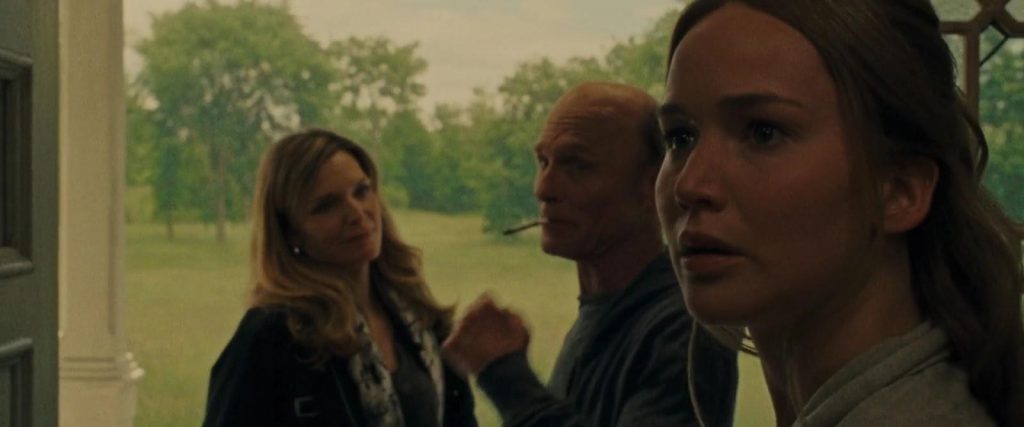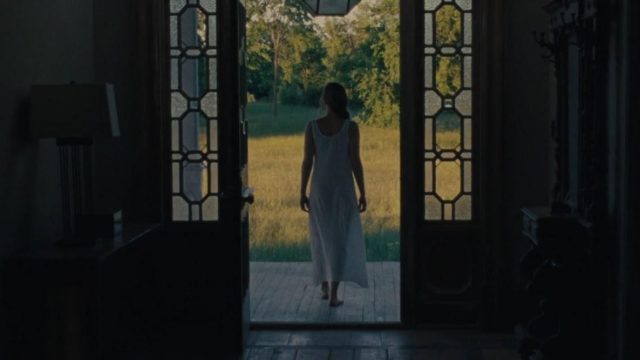Since Cinemascore began operation in 1979 only 19 films have received the lowest score. In this series I’ll be reviewing those 19 films. This week, it’s time to burn it all to the ground.
So What is it?
mother! is a retelling of The Bible as a horror farce.
The film follows Jennifer Lawarence as the titular mother(!) who lives a quiet peaceful life with her husband Javier Bardem. The two are artists. Bardem is a great author and Lawrence pours her creative energies into repairing and remodeling their house, with which she seems to have a symbiotic connection.
One day a stranger (Ed Harris) appears, and Bardem welcomes him into their home. Lawrence is somewhat annoyed by this, but she is a gracious host and makes a place for him. Harris is frail and weak. He is a kind man, enamored with Bardem, and respectful of Lawrence and their home.
The next day Harris’s wife (Michelle Pfieffer in one of the best performances of her career) arrives at the house. Pfeiffer is a childish woman, a gossip, and falls quickly into a competitive and disrespectful relationship with Lawrence. Soon the two guests sneak into Bardem’s office and break a very precious ornament. Bardem, furious, boards up the door to the office, but when Lawrence asks to send the guests away, he refuses. “Where would they go?”
Next the couple’s two sons arrive, get into an argument, and one kills the other. Bardem tries to comfort the family, telling them that the dead are not truly gone, and this quickly becomes a ritual among the guests. More people show up, and soon the house is overflowing with destructive and disrespectful hordes. Lawrence loses her temper, a pipe breaks in the house, and there is a great flood that washes all the people away.
The couple is now alone and at peace. They make love, Lawrence becomes pregnant, and those of us that remember our Sunday School start getting very nervous. Bardem finishes his masterwork, months pass, and the two are happy and peaceful.
But soon more visitors appear at the house, drawn there by a desire to see the great poet. Once again, the house is soon overflowing with intruders, even more destructive than before. People steal dishes and tear the plaster off the walls. Violence breaks out. Riots, wars, rape and murder, slavery and genocide. Lawrence wanders about, witnessing all of this, but powerless to stop it. The violence threatens her as well, and she begins to go into labor, desperately trying to find a safe private place to have her child.
Bardem appears again and carries her back to Eden, his still sealed-off office, and she gives birth. She pleads with Bardem to send the people away, but he refuses, and in turn she refuses to let him hold the child. But eventually she dozes off and wakes to find Bardem presenting the baby to the masses. She rushes to save the baby but it’s too late. The infant is being passed along the crowd. She chases after him but… while the crucifixion is only figurative here, the eucharist is gruesomely literal.
She attacks the crowd and the crowd turns on her, tearing away her clothes, and violently beating her. Bardem eventually makes his way to her and forces back the mob. He tells her that they must forgive these people, that the death of their child is a tragedy, but also an opportunity to change everything.
Lawrence cannot forgive, and she makes her way to the furnace and ignites the house and all its inhabitants in hellfire.
When the fire clears, Bardem remains. He gently carries Lawrence’s charred body to what was once the center of their home and he begins the story again.
So Why the F?
mother! is a retelling of The Bible as a horror farce.
This movie also has perhaps the most intentionally misleading ad campaign of any film in the entire series. mother! was always going to be a tough sell, and so the studio decided to sell a completely different film! A taut star-studded thriller from the director of Black Swan instead of an elaborate allegory from the director of Noah (C).
This is also the only film in the entire series that I was able to see in a packed theater during its initial release, and from my research with a sample only trivially smaller than the one Cinemascore works with, people really seemed to turn on the movie after the babyeating scene, and were outright heckling by the movie’s openly supernatural ending.
So Were they right?
To quote Aronofsky himself, “How if you walk out of this movie are you not going to give it an F?”
This was never going to be a crowd pleaser, even if they didn’t eat that baby. But once you catch on to what the film is doing, it quickly develops a funny and engaging rhythm, with Jennifer Lawrence’s Mother Earth playing straight man to the absurd and destructive human race and Bardem’s compassionate but oblivious deity. While the movie is blunt (though not so blunt that half the critics who complained about its “lack of subtlety” weren’t still able to egregiously misread the film), it is not without depth. Bardem is an interesting take on God; creative, empathetic, curious, passionate, forgiving, but also self-absorbed, oblivious, and kind of a dick.
Its view of humanity has a certain cathartic power to it as well. It is not some cosmic power – God or Satan or Fate – that is responsible for our suffering. It is our own nature. No one is making us kill, rape, and pillage. No one is making us burn down the Earth. We are responsible for our own salvation and will be responsible for our own damnation. The film has little patience for human arrogance and particularly the arrogance of religious people who imagine themselves as God’s chosen favorites while also busying themselves with the destruction of his creation.
mother! is tense, propulsive, engaging, and sharply funny. It’s also misanthropic, fatalistic and perhaps even blasphemous.
How can you walk out of this movie and not give it an A?

Next Week: We reflect on the series as a whole and try to break down what exactly creates an F.


